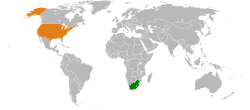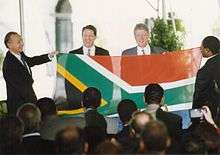South Africa–United States relations
 |
|
South Africa |
United States |
|---|---|
South Africa–United States relations are bilateral relations between South Africa and the United States.
According to the 2012 U.S. Global Leadership Report, 76% of South Africans approve of U.S. leadership, with 15% disapproving and 9% uncertain.[1]
It is estimated that as of 2010 around 78,616 South Africans resided in the United States.[2]
History

The United States has maintained an official presence in South Africa since 1799, when an American consulate was opened in Cape Town. The U.S. Embassy is located in Pretoria, and Consulates General are in Johannesburg, Durban and Cape Town. Americans and South Africans also have many non-governmental ties: black and white American missionaries, for example, have a long history of activity in South Africa. South Africans (particularly the ANC leadership) also acknowledge support from and ties to the anti-apartheid movement in the U.S.
Apartheid Era
In a speech in Washington D.C., Bishop Desmond Tutu described U.S. engagement with South Africa as “an abomination,” going on to describe Reagan’s close ties to the Pretoria régime as “immoral, evil and totally un-Christian.” [3] Reagan had previously attempted to veto a congressional motion calling for the release of Nelson Mandela.
Post Apartheid
Since the abolition of apartheid and the first-ever democratic elections of April 1994, the United States has enjoyed an excellent bilateral relationship with South Africa. Although there are differences of position between the two governments (regarding Iraq, for example), they have not impeded cooperation on a broad range of key issues. Bilateral cooperation in counter-terrorism, fighting HIV/AIDS, and military relations has been particularly positive. Through the U.S. Agency for International Development (USAID), the United States also provides assistance to South Africa to help them meet their developmental goals. Peace Corps volunteers began working in South Africa in 1997.
During the presidency of Thabo Mbeki (1999-2008) relations were strained due to a combination of the ANC's paranoia around alleged CIA activities in the country and perceived criticism of Mebeki's AIDS denialism. A feeling partly based on the ANC's experiences of tacit American support for the Apartheid government during the Reagan administration. The Bush administration's wars in Afghanistan and Iraq as well as its PEPFAR imitative (that clashed with Mbeki's views on AIDS) served to alienate the South African presidency until president Mbeki left government in 2008.[4]
Until 2008, the United States had officially considered Nelson Mandela a terrorist,[5] however on the 5th of July 2008 Mandela along with as other ANC members including the then current foreign minister were removed from a US terrorist watchlist. Harry Schwarz, who served as South African Ambassador to the United States during its transition to representative democracy (1991–1994), has been credited as having played one of the leading roles in the renewal of relations between the two nations.[6] Peter Fabricius described Schwarz as having "engineered a state of US/South Africa relations better than it has ever been”.[7] The fact that Schwarz, for decades a well known anti-apartheid figurehead, was willing to accept the position was widely acknowledged as a highly symbolic demonstration of President F. W de Klerk's determination to introduce a new democratic system.[8][9][10][11] During Schwarz's tenure, he negotiated the lifting of US sanctions against South Africa, secured a $600 million aid package from President Bill Clinton, signed the Nuclear Non-Proliferation Treaty in 1991 and hosted President Mandela's state visit to the US in October 1994.[12]
On 28 January 2009, newly elected US President Barack Obama telephoned his newly installed counterpart Kgalema Motlanthe as one of a list of foreign contacts he had been working through since his presidential inauguration the previous week. Given primary treatment was South Africa's role in helping to resolve the political crisis in Zimbabwe. According to White House spokesman Robert Gibbs, the pair "shared concerns" on the matter. Obama credited South Africa for holding "a key role" in resolving the Zimbabwean crisis, and said that he was looking forward to working with President Motlanthe to address global financial issues at the 2009 G-20 London summit.[13]
The election of Obama along with Mbeki's departure from office as well as the enactment of the African Growth and Opportunity Act (AGOA) with South Africa as a key beneficiary greatly improved opinions within the South African government of its relationship with the United States. As of 2014 the relationship between South Africa and the United States in the Zuma/Obama years is thought not to be as close as it was during the Mandela/Clinton years but greatly improved since the Mbeki/Bush years.[4]
Diplomatic visits
Diplomatic visits between the two nations increased near the end of apartheid. In February 1990, U.S. President George H.W. Bush invited both sitting South African President F.W. de Klerk and ANC leader Nelson Mandela to visit the White House. Both men accepted the invitation, with de Klerk scheduled to visit June 18, 1990 and Mandela, recently released from prison, scheduled to visit a week later. After controversy arose in South Africa, de Klerk postponed his visit. Mandela visited Washington on June 24, 1990 and met with President Bush and other officials. He also addressed a joint session of Congress. In September, de Klerk visited Washington, the first official state visit by a South African leader.
Mandela was subsequently elected President of South Africa, and U.S. Vice President Al Gore and First Lady Hillary Clinton attended his inauguration in Pretoria in May 1994. In October of that year, Mandela returned to Washington for a state dinner hosted by U.S. President Bill Clinton.
President Clinton visited South Africa in March 1998, marking the first time a sitting U.S. president visited the country. Since Clinton's visit, both of his successors have visited the country: President George W. Bush visited in July 2003, and President Barack Obama visited in June 2013.
Principal officials
Principal U.S. officials
- Ambassador – Patrick Gaspard
- Deputy Chief of Mission – Jessye Lapenn
- Commercial Counselor – Craig Allen
- Economic Counselor – Perry Ball
- Political Counselor – Raymond L. Brown
- Management Counselor – Russell LeClair
- Public Affairs Counselor – Mary Deane Conners
- Defense and Air Attache – Colonel Michael Muolo
- USAID Director – Carleene Dei
- Agricultural Attache – Scott Reynolds
- Health Attache – Mary Fanning
- Consul General Cape Town – Helen LaLime
- Consul General Durban – Eugene S. Young
- Consul General Johannesburg – Steven P. Coffman
Principal South African officials
See also
- South African Americans
- Foreign relations of South Africa
- Foreign relations of the United States
- Constructive engagement
Notes
- ↑ U.S. Global Leadership Project Report - 2012 Gallup
- ↑ "How many South Africans have left the country?". Politics Web. 14 August 2012. Retrieved 28 August 2015.
- ↑ Landay, Jonathan (2013-06-12). "In Ronald Reagan era, Mandela was branded a terrorist.". USA Today. Retrieved 2013-06-12.
- 1 2 Pillay, Verashni (15 September 2014). "How the US and South Africa became friends again". Mail and Guardian. Retrieved 17 September 2014.
- ↑ Hall, Mimi (2008-05-01). "U.S. has Mandela on terrorist list". USA Today. Retrieved 2008-05-06.
- ↑ http://www.samedia.uovs.ac.za/Imagedir/Image4/1994/007/09915.tif
- ↑ http://www.samedia.uovs.ac.za/cgi-bin/getpdf?id=940042
- ↑ http://www.samedia.uovs.ac.za/Imagedir/Image4/1990/007/14163.tif
- ↑ http://www.samedia.uovs.ac.za/Imagedir/Image4/1990/007/14253.tif
- ↑ http://www.samedia.uovs.ac.za/Imagedir/Image4/1990/007/14445.tif
- ↑ http://www.samedia.uovs.ac.za/Imagedir/Image4/1991/007/04818.tif
- ↑ http://www.samedia.uovs.ac.za/Imagedir/Image4/1994/007/05929.tif
- ↑ Quoted in AFP 2009.
References
- Agence France-Presse. "Obama phones Motlanthe." News24, 29 January 2009.
-
 This article incorporates public domain material from the United States Department of State website http://www.state.gov/r/pa/ei/bgn/index.htm (Background Notes).
This article incorporates public domain material from the United States Department of State website http://www.state.gov/r/pa/ei/bgn/index.htm (Background Notes).
Further reading
- U.S. Relations with South Africa: Books, documents, reports, and monographs by Y. G.-M. Lulat (1991), Westview Press, Boulder, CO. ISBN 978-0-8133-7138-2.
.svg.png)